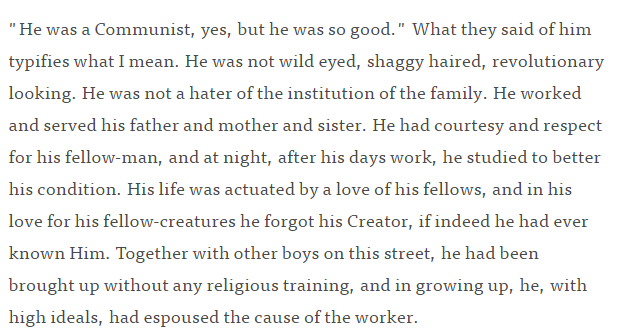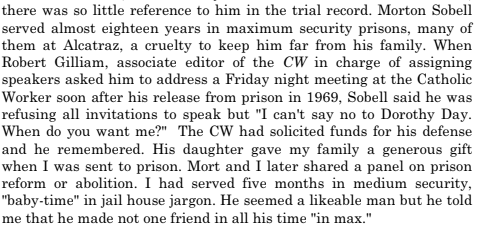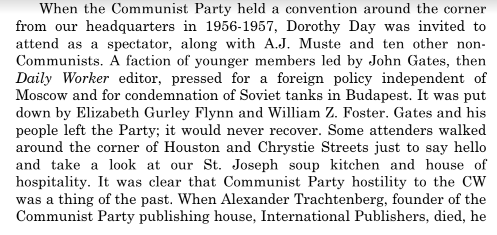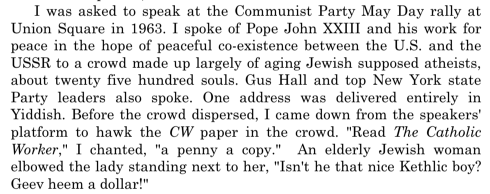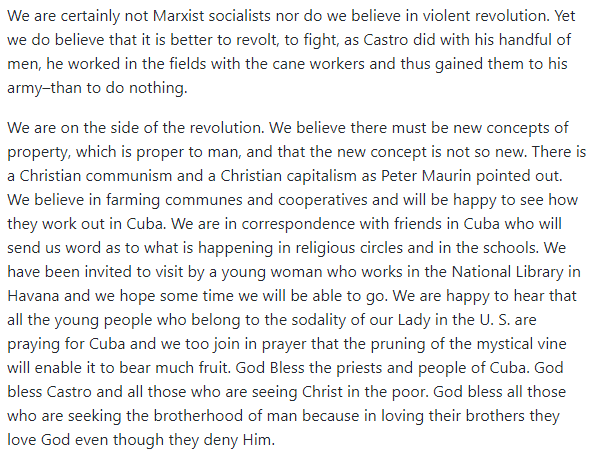More people who are into Dorothy Day should be reading about the Communist Party USA. It& #39;s indispensable not only for understanding her own trajectory, but also the fascinating web of solidarity the Catholic Worker managed to hold onto.
It& #39;s well known that Day was very close to the CPUSA before her conversion, including writing for its outlets and participating in some significant action. But people often stop the story after her conversion.
(Let me clarify a little further.)
Getting a feel for what the culture around the CPUSA was like at its height makes so much sense for why Day found it so compelling. Vivian Gornick& #39;s recently republished book "The Romance of American Communism" is a great example.
When people think of Communism, especially in the Depression, they automatically default to a caricatured picture of Stalinism, espionage, and a litany of Cold War tropes. But the life of the Party was incredibly diverse and profoundly spiritual, a place of moral commitment.
Over a million people passed through the CPUSA at one point or another in the Depression, and the CPUSA also collected the energies of all kinds of other radicals (the IWW, the Social Gospel, the women& #39;s movement, Black sharecroppers in Alabama, and so on).
In her introduction to the new edition of The Romance of American Communism, Gornick describes the "type" of person that Day would have been in contact with as she not only hung around but worked with the CPUSA.
Labor historians regularly note that, both for better and for worse, Party life was an incredibly thick subculture, full of people willing to make real sacrifices, bound together in comradely belonging, and all based on a profound moral--not just political--disposition.
What Day found in the Catholic Church is, frankly, not that different from what she found in the CPUSA in terms of an affective life. A community of converts, inspired by saintly martyrs and a basically absurd belief that a completely different world is both possible and here.
Day basically says as much in a 1933 article for America Magazine; here& #39;s how she describes a Communist boy who had been killed by a brick. (She converted in 1927; the CW was founded in 1933.)
https://www.americamagazine.org/faith/1933/04/19/dorothy-day-what-catholics-dont-understand-about-communism">https://www.americamagazine.org/faith/193...
https://www.americamagazine.org/faith/1933/04/19/dorothy-day-what-catholics-dont-understand-about-communism">https://www.americamagazine.org/faith/193...
Though in the rest of that article Day goes on to mark her significant distance from Communism--and many of her comrades were dismayed by her conversion--Day didn& #39;t stop fraternizing with the Communists, and neither did the Catholic Worker.
Day was famously friends with radicals like Anna Louise Strong, Elizabeth Gurley Flynn, and Mike Gold, among many others. Members of the Catholic Worker and CPUSA often rubbed elbows on picket lines and were both targeted by police.
When Communists were imprisoned after the Smith Act in & #39;57, Day visited Flynn. Tom Cornell, a longtime CW member, provides a wealth of information in his article "The Catholic Worker, Communism and the Communist Party," including this anecdote about Communist Morton Sobell:
Some other great anecdotes from Cornell (the whole article is a lovely history): 1) CW& #39;s being invited as observers to a very important Party convention; 2) Day speaking at CPUSA member funerals; 3) Cornell speaking at a May Day rally by CPUSA invitation.
Despite their ideological differences, the Catholic Worker and the CPUSA were bound together by that bizarre decision to ruin your life in a particular way because you believe in a radical, spiritual demand--which also got them in similar material trouble.
It& #39;s true that Day remained fervently and decidedly *not* a Communist after her conversion. Her own politics are not consistent, but if I had to pin it down to one label (and we don& #39;t have to, but for kicks), I& #39;d say she puts forward a Catholic personalist anarchism.
But even despite her political preferences, Day knew enough about communists to know they, and their ideology, were more complicated than Cold War caricatures. And still further, she continued to be an interested observer of communist struggles around the world.
For instance, after the Cuban Revolution took a communist turn, Dorothy Day traveled there to report on what was going on for the Catholic Worker. Here are a couple of those reports:
https://www.catholicworker.org/dorothyday/articles/246.html
https://www.catholicworker.org/dorothyda... href=" http://dorothyday.catholicworker.org/articles/793.html">https://dorothyday.catholicworker.org/articles/...
https://www.catholicworker.org/dorothyday/articles/246.html
I think this passage really summarizes a lot of Day& #39;s relationship to communism. She& #39;s not a Marxist, she reminds her readers. But, "We are o nthe side of the revolution.... There is a Christian communism and a Christian capitalism as Peter Maurin pointed out."
This thread is getting a little unwieldy, but let me sum up a couple points as to why I think it matters. First, if you don& #39;t understand the CPUSA Day encountered, you lose something about the social world in which the Catholic Worker was immersed. So there& #39;s a historical piece.
But second, you also miss out on an understanding of Day& #39;s own personalism, which could detect the moral impulses throbbing in the heart of any person, even a godless Communist. I take it that& #39;s one reason she& #39;s on the path to sainthood.
And third, attending to the Catholic Worker& #39;s relationship to Communism also helps us avoid needlessly domesticating the Catholic Worker and Dorothy Day, both historically and today.
Which is all to say, if you want a full picture of Dorothy Day and the Catholic Worker, it really is beneficial to get a sense of their fellow travelers, especially the CPUSA. As a bonus, the history of the CPUSA is also wild and fascinating to read about!

 Read on Twitter
Read on Twitter
